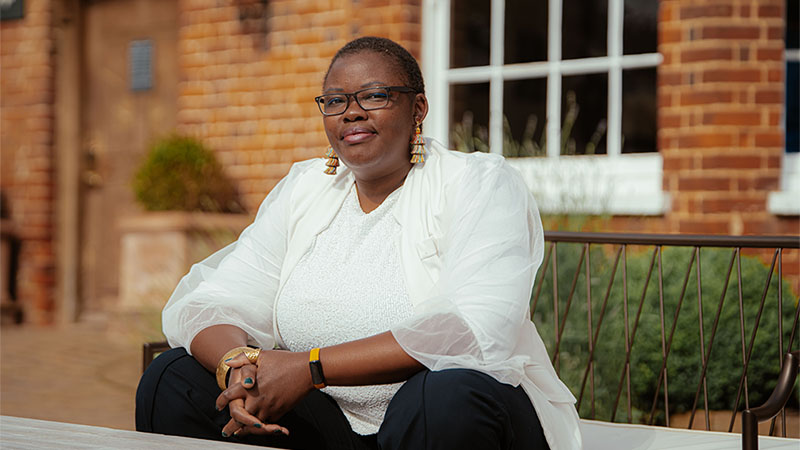AMA: Beatrice Kabutakapua, founder of The Business Storytelling Centre
Meet Beatrice N. Kabutakapua, founder of the Business Storytelling Centre, a business coaching firm helping leaders amplify unheard voices. ...
Manage your equity and shareholders
Share schemes & options
Equity management
Migrate to Vestd
Company valuations
Fundraising
Launch funds, evalute deals & invest
Special Purpose Vehicles (SPV)
Manage your portfolio
Model future scenarios
Powerful tools and five-star support
Employee share schemes
Predictable pricing and no hidden charges
For startups
For scaleups & SMEs
For larger companies
Ideas, insight and tools to help you grow

Founder and CEO Hannah Thomson talks to us about how the loss of her beloved Grandmother led to the development of The Joy Club, and how she overcame pandemic challenges to grow her business and serve an overlooked target market.
The origin of the word ‘retirement’ is to ‘withdraw the mind’. We know that the modern retiree wants the opposite. So, we’re building the go-to platform for content and experiences that resonate with this important but underserved demographic.
I spent my twenties working in other founders’ high-growth early-stage tech startups, including as Head of Strategic Partnerships for femtech company Elvie. I knew I wanted to become a founder myself and was waiting for the lightbulb moment.
That came when I lost my adventurous Granny Jean - I wanted to pay tribute to her and thought what better way than to bring my tech startup experience together with her blueprint for a joyful retirement and share that with as many people as possible.

I launched The Joy Club during the Covid-19 pandemic. I raised the first investment round in March 2020, days before the first lockdown, then raised all subsequent rounds and hired my team over Zoom.
Building The Joy Club during lockdown has enabled me to create a business that is intrinsically flexible and resilient.
Something that still serves us well.
Another aspect of creating The Joy Club, which could be perceived as a challenge, is that I am not representative of the end user. I am less than half the age of our average customer and at a very different life stage, with different needs and reference points.
I'm not representative of the end user, which posed a challenge.
To address this, I consulted over 100 people on their retirement journey, to inform the company’s initial stages of creation.
Since launch, I have involved thousands of members in the development of The Joy Club through surveys, insights interviews, and involvement in our Member Steering Group. Through this radically user-centric approach, we have created a platform that truly resonates with our users.
The Joy Club is on a mission to build the largest and joyful community of retirees globally, by partnering with large and leading organisations and by taking a radically customer-centric approach to product design. Our remote-first culture has enabled me to hire the best talent from across the UK.
So, the team is made up of highly capable people, with big ambitions, who genuinely want to work in an environment where they can have a tangible and positive impact.
As a testament to this, The Joy Club was named by Impact Fifty as one of the 50 most meaningful companies to work for in the UK in 2023. This award is given to companies where employees most feel they are making a difference to an important cause – other winners include Patagonia, Headspace, and UNICEF.
I’m a devotee to Matt Lerner’s SYSTM approach, which involves identifying a North Star Metric, to which everyone’s work should relate, as well as three key drivers. The three key drivers are the metrics that will drive your business forward and around which experiments are run.
We meet weekly as a whole company, to discuss progress against our North Star Metric and key drivers.
And to push forward initiatives and experiments to further drive performance.
Of course, I also keep a hawkish eye on key metrics for our B2B2C business, like MRR, ACV, LTV, CAC, and retention, but these are ultimately lagging indicators of our ability to deliver value to our partners and customers; it is the North Star Metric and key drivers that I organise the team’s focus around.
I’ve raised £3.2m pre-seed capital to date from awesome investors, who are excited by our mission and level of ambition. We’re backed by Calm/Storm VC and Impact Shakers, along with impressive angels like Elvie founder Tania Boler and Google Maps co-founder Lars Rasmussen.
Around 1% of VC funding in the UK goes to sole female founders like me.
And the research suggests that a contributing factor is that female founders receive more ‘downside’ questions than ‘upside’ questions, whereas the opposite is true for male founders.
So, my advice for female founders in particular is to:
Acknowledge and answer the downside questions but move the conversation to the upside opportunity.
The VC model is looking for enormous returns, so you need to make space in the conversation to convince the investor that you’re capable of achieving £100m ARR.
Everyone on the team gets EMI options when they join, ensuring that they have a real sense of ownership in the work we’re doing and a vested interest in helping to deliver long-term success.
It is typical for levels of equity compensation to be differentiated for technical and non-technical roles but I found this - if applied practically - would lead to gender inequality in option holdings.
By not differentiating between technical and non-technical roles, we can avoid an employee option gender gap.
So, I allocate share options without differentiation for technical and non-technical roles, to support equality in this regard.
We’re actively working on achieving more diversity in The Joy Club team and membership base. At The Joy Club, diversity and inclusion begin with our hiring processes.
We post any new roles on a wide range of job sites to increase our reach, and we don’t begin the interview process for any role until we have a diverse pool of candidates to engage with.
We continue to prioritise diversity and inclusion within our workplace culture and I keep my finger on the pulse through anonymous employee surveys. In our last survey, every employee selected ‘strongly agree’ when asked whether they feel The Joy Club is an inclusive workplace.
We encourage diversity and inclusion within our membership base, by working with a diverse range of event facilitators and content creators who are able to bring their experiences to our community.
Some particular favourites that come to mind include an LGBT+ history tour of London, a course on the cultural impact of Indian dance, a session on how colonisation affected music, and our wide variety of cookery classes based on various ethnic cuisines.
We also ensure that our marketing materials reflect the diversity within our membership demographic, ensuring that everyone feels welcome at The Joy Club.
This passage from Theodore Roosevelt reflects my attitude to life and business:
“It is not the critic who counts; not the man who points out how the strong man stumbles, or where the doer of deeds could have done them better.
"The credit belongs to the man who is actually in the arena, whose face is marred by dust and sweat and blood; who strives valiantly; who errs, who comes short again and again, because there is no effort without error and shortcoming;
"But who does actually strive to do the deeds; who knows great enthusiasms, the great devotions; who spends himself in a worthy cause; who at the best knows, in the end, the triumph of high achievement, and who at the worst, if he fails, at least fails while daring greatly, so that his place shall never be with those cold and timid souls who neither know victory nor defeat.”
I first heard it when read by my skipper, on the foredeck of a yacht before we set sail to race across the Atlantic - a race we won. Since then, I have put it in a frame on my desk and had the words ‘in the arena’ tattooed on my arm - a matching tattoo with my closest advisor and dear friend, Jane Reddin, who is a partner at Albion Capital.
For nearly ten years, I’ve been blocking out my calendar in 30-minute chunks for meetings and tasks, so that I always have the sense of an impending deadline and never spend more time than I have on one particular thing. With this method, I find I can work 12-hour days without losing focus or slowing down.
I block out my calendar in 30-minute chunks.
I asked my team about their productivity hacks, and one of my favourite answers came from our Senior Commissioning Editor, Kathy, who professes to ‘eating the frog’, meaning that she gets her least favourite thing done first every day, giving her the rest of the day for more enjoyable tasks - great tip!

Meet Beatrice N. Kabutakapua, founder of the Business Storytelling Centre, a business coaching firm helping leaders amplify unheard voices. ...

In our final instalment of The Business Pharmacy series, Rita Trehan, the founder and CEO of DARE Worldwide, shares her 'prescription' for prosperity.

Over the past year, Laura Thomson’s design practice has grown from a solo enterprise to a fully-fledged team.